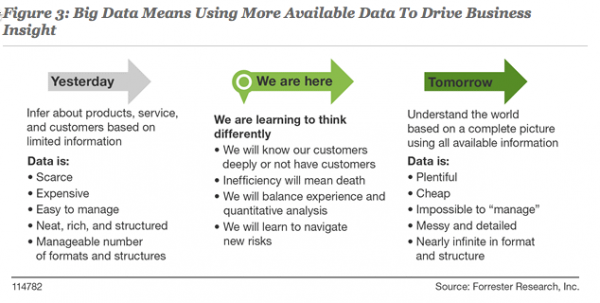What better way to start blogging on Digital Transformation than on a topic not usually touched by a Digital Experience guy but still extremely relevant. Forrester released a report back in May on what Big Data means for marketing.
I won’t repeat the entire report but will highlight a few nuggets of information that might give you some interest in reading the entire report.
Traditional data practices were developed in a time where data was scarce, expensive, and used by a small population of decision-makers to manage performance. But data is no longer scarce. New, rapidly evolving techniques and technologies can help you get business insight from this explosion of data. Despite this, we still find firms clinging to traditional thinking and practices.
……
In a digital world, data plays a big role in helping your firm win, serve, and retain its customers. Not only do you often need more and different data, you need bigger thinking on how to use data, and bigger capabilities to help you put all available data to use (see Figure 3). Forrester defines big data as:
The practices and technologies that close the gap between the data available and the ability to turn that data into business insight.
Big data isn’t just about volume; it’s also about the characteristics of data. Today’s available data is more diverse and messier than what you are used to. And, since it’s often not “owned” or controlled by your organization — e.g., open data, consumer preferences, and partner data — it challenges your natural tendency toward data hoarding. Firms that embrace big data will:
- Excel at real time predictions
- Deliver highly personalized customer experiences
- Continuously optimize analytics and insight practices
- Strike a balance between qualitative and quantitative tools
This changes things around a bit. We now have clients demanding that we create these highly personalized experiences but find we cannot deliver without bringing in the data experts. This means both data scientists who ask the right questions and understand the answers as well as data technologists who make the technologies work.
It looks like this:

There’s a lot more Forrester says and what it looks like so it’s worth it to read the entire report.
